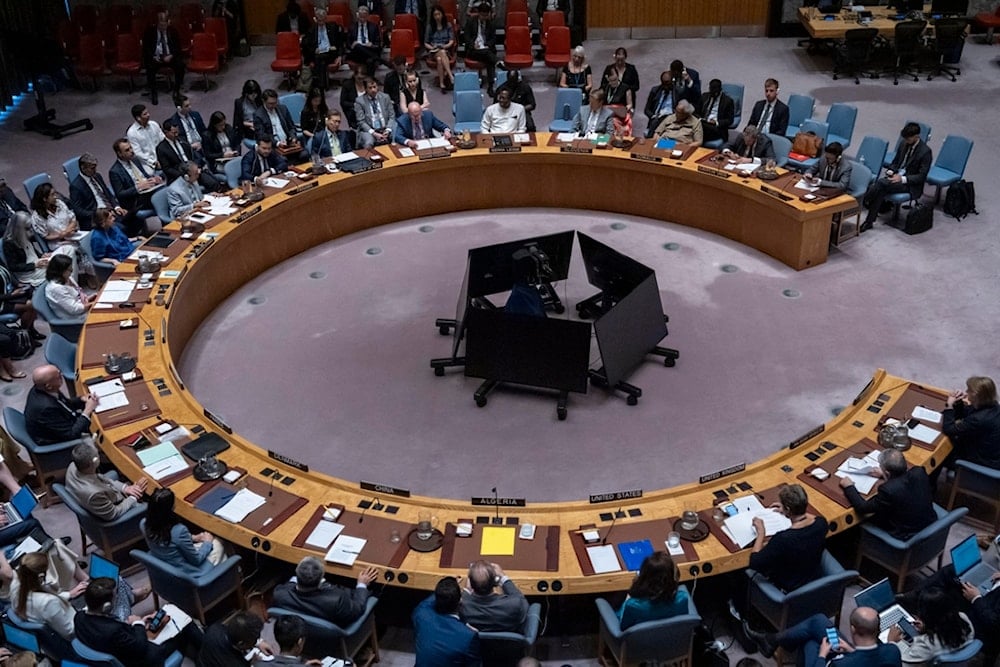Iran vows response as E3 triggers UN 'snapback' sanctions mechanism
Iran condemned as "illegal" the E3's decision to trigger the UN snapback mechanism to reimpose sanctions, warning of an appropriate response amid stalled nuclear diplomacy.
-

A Security Council meeting is held at the United Nations Headquarters, Tuesday, June 24, 2025. (AP Photo/Yuki Iwamura)
Iran’s Foreign Ministry confirmed on Thursday that France, Britain, and Germany have formally notified Tehran of their decision to trigger the "snapback" mechanism to reimpose United Nations sanctions under the 2015 nuclear deal.
Foreign Minister Abbas Araghchi condemned the measure as "illegal and unjustified," warning that Tehran would respond "appropriately to protect and guarantee its national rights and interests."
In a phone call with his French, British, and German counterparts, Araghchi urged them to "appropriately correct this wrong decision in the coming days." He stopped short of detailing possible retaliatory steps but hinted that the E3 risk being excluded from any future negotiations on Iran’s nuclear program.
The E3 action came just days after Iranian and European diplomats held a second round of talks in Geneva, billed as a last chance to salvage engagement before the October deadline for invoking the snapback clause.
The discussions collapsed without "tangible commitments," according to European officials, who claim that Tehran’s ongoing breaches of enrichment limits left them with no choice but to act.
Iran Rejects E3 Snapback Attempt, Cites JCPOA Dispute Mechanism
The Iranian Foreign Ministry on Thursday strongly condemned the notification submitted by France, Germany, and the United Kingdom (E3) to the UN Security Council seeking to reimpose sanctions under Resolution 2231. Tehran described the move as “illegal, baseless, and politically motivated.”
In a statement, Iran said the European trio has no authority to resort to the snapback process, noting that the Dispute Resolution Mechanism (DRM) outlined in the Joint Comprehensive Plan of Action (JCPOA) is a binding, multi-stage consultation framework meant to prevent unilateral abuse. According to Tehran, the E3 bypassed this process, rendering their notification “null and void.”
Iran further accused the three states of serious non-compliance with their JCPOA obligations following the US withdrawal in 2018, arguing that they cannot claim to act in good faith while imposing their own sanctions and failing to deliver economic relief promised under the accord.
The ministry warned that the E3’s action undermines Iran’s ongoing cooperation with the International Atomic Energy Agency (IAEA) and risks “damaging the credibility of the Security Council” while endangering international peace and security. Tehran vowed to respond with “appropriate measures” to what it called a provocative and unlawful escalation.
Sanctions Dispute
Iran has long disputed the Western narrative, stressing that it has consistently denied seeking nuclear weapons and linking its cooperation with the International Atomic Energy Agency (IAEA) to parliamentary and National Security Council approval.
Although IAEA inspectors returned to Iran in August following a suspension triggered by Israeli and US attacks on nuclear facilities in June, disagreements remain over the scope of inspections.
The UN Security Council president confirmed receipt of a letter from the E3 requesting activation of the mechanism, with diplomats saying the Council will convene on Friday to debate the matter. Russia and China have already signaled opposition to the move, proposing a six-month delay in sanctions to allow diplomacy to continue.
Read more: Europe has no right to invoke snapback mechanism under JCPOA: Azizi
The 2015 nuclear agreement, formally known as the Joint Comprehensive Plan of Action (JCPOA), was undermined in 2018 when then-US President Donald Trump withdrew and reimposed sweeping sanctions.
Renewed talks between Tehran and Washington began in April but were derailed by the June war with "Israel," during which US strikes also targeted Iranian nuclear sites.

 4 Min Read
4 Min Read








